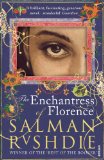 I don’t quite know what to make of this book. There were so many storylines in so many countries at so many different times, all overlapping and sloshing around at the same time, that at times the book became overwhelming. The writing is beautiful, the concept fascinating, but somehow I didn’t find the book as compelling as I expected to.
I don’t quite know what to make of this book. There were so many storylines in so many countries at so many different times, all overlapping and sloshing around at the same time, that at times the book became overwhelming. The writing is beautiful, the concept fascinating, but somehow I didn’t find the book as compelling as I expected to.
I went to see Salman Rushdie at the Southbank Centre in London last year and he read from the book and talked about it. It sounded fascinating – the main theme is the relationship between East and West, how each perceives the other, how in the end there are more similarities than differences. It’s also about storytelling – the plot is driven by a traveller from Italy who turns up at the Mughal court with a bizarre, unbelievable tale to tell. His life depends on telling the story and being believed. He’s not the only character in the book who faces this situation – Argalia saves his own life several times by telling tall tales as he goes from Italian orphan to stowaway to fearsome Turkish warrior to powerful Florentine condottiere. Meanwhile the Mughal emperor Akbar has so powerful an imagination that he invents an imaginary wife who acts as a character in the novel.
At times I was swept up by all the beauty in the writing, the dazzling stories within stories within stories, the skill with which Rushdie constantly sails close to the wind, presenting us with increasingly bizarre and unbelievable situations and yet somehow always keeping the story just about believable. But when it was all over, I was left feeling a little disappointed. I think perhaps there was just so much going on that I never developed a real affinity for any particular character. I was so busy trying to remember the names of the enormous cast of characters and how they related to each other, and then having to restart all over again each time the book shifted to a different continent or century, that I had no time or mental energy left over for caring about the characters themselves. So while I enjoyed the story and how it was told, I didn’t really care how it would end. And while the book dazzled me as I read it, I don’t think I’ll remember it for very long.



There are 3 comments
I’ve kind of expected The Enchantress won’t be as compelling as Midnight’s Children, from a lot of reviews I’ve read. But I still do want to read it, because I think I’m a sucker for writing more than the story sometimes. What I love about Rushdie is he just blows me away with his words and sometimes it doesn’t really matter what happens. I know he might be a bit indulgent, and I did dislike Fury for that. But your review of Enchantress reminds me of my first Rushdie read: The Moor’s Last Sigh. It was all so complicated but the writing was fabulous. So I’m prepared to head on to this and I hope to be a bit disappointed so I might be less inclined to be so.
I can appreciate exactly what you are saying Andrew, and felt much the same way when reading One Hundred Years of Solitude by Gabriel Garcia Marquez.
I have never read anything by Rushdie, but continue to hear conflicting reviews of his work. I think in the interest of being well informed I will have to prioritize one of his books.
Interesting, your review is in line with every other I’ve read, even the real Rushdie fans don’t seem wholly taken by this one.
I’m interested in Rushdie, but not having seen a single wholly positive review for this work, I don’t think I’ll be adding it to my to be read pile anytime soon. If I prioritise one of his books, it will I think be one of the earlier ones, Midnight’s Children perhaps.
Stories about storytelling are risky things, the final story in Vikram Chandra’s Love and Longing in Bombay is all about storytelling itself – it contains a story told by a storyteller about a couple who meet through telling each other stories, and so there are stories nested within a story which in turn is nested within the overall work by Chandra itself. I found it fairly dazzling, but then I found Love and Longing in Bombay dazzling generally, it’s a bloody hard to pull off though and my impression (based admittedly on second hand reports, not having read it myself) is that this time Rushdie didn’t quite manage.
The rest of the Chandra is also excellent by the way, that final story is him pulling the stops out a bit, I wouldn’t want to give the impression the whole thing is literary trickery, it’s really not.